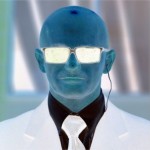He was by any past or present measure one of the coldest and most calculating of Uncle Sam's Cold Warriors. A strong pro-war hawk on Vietnam, amongst many other dubious achievements he was also notorious for his surveillance of anti-war protesters, political activists and domestic dissidents (of which there were no shortages) during the Vietnam War and throughout the 60's and early 70's.
He has also been frequently mentioned as having involvement in, knowledge of, and/or connections to the JFK hit and the Norma Jean (Marilyn Monroe) suicide/accidental death/murder (you decide).
As good as Angleton was at his craft, he wasn't good enough though to pick up on arguably the biggest spies in the West before they defected to the USSR, who were operating out of the august Cambridge University. The Cambridge Five as they were branded for posterity, comprised Kim Philby, Guy Burgess, Donald Maclean, and Anthony Blunt (there apparently was a fifth member, who was infamously never identified, itself a mystery within a mystery, and one which must have both haunted and frustrated Angleton to his dying day).
This spy ring worked at the highest levels within British intelligence and passed highly classified information to the Soviets throughout the war and into the 1950s and early 60s, at which point several folks on both sides of the pond--including Angleton himself and the redoubtable William "Bill" Harvey, another legendarily notorious CIA affiliated Cold Warrior of the era--began to smell a rat.
Of the "Five", Philby--who worked with Angleton in London during the war, and indeed, was Angleton's mentor--is believed to have done the most damage to Western intelligence, with the top secret information he passed to the Soviet Union resulting in the deaths of scores of agents.
The Cambridge Five episode is a useful pointer to the CIA's relationship with the UK's premier spying services MI5 and MI6. As the counterintelligence chief, part of Angleton's responsibility involved liaison with foreign intelligence and security agencies, including Israel's Mossad, Iran's SAVAK, and West Gernany's BND.
Although some say he had his suspicions about the Cambridge group before anyone else did including the British, he failed to act on these in time to prevent their subsequent defection. By all accounts this was an outcome from which he never recovered, and indeed amongst many other missteps, it brought about his downfall eventually, but not for some time to come.
After the belated discovery of the aforementioned Cambridge Five, Angleton became even more paranoid, seeing spies all over the Langley complex and beyond. To an extent this was understandable. Philby and Angleton--both men bona fide dipsomaniacs--would 'get pissed' together whenever Philby visited Washington, and both would enthusiastically talk 'spy-shop' and exchange information.
To say there was a strong bond between the men is an understatement. From this we can safely surmise herein such secrets as they were revealed contributed to the premature demise of at least some of those Western agents. Or put another way: whatever information Angleton provided Philby was of more value than that which Philby provided to him.
Either way, this born-again paranoia fuelled by Cambridge Five revelations began to irritate a lot of people, managing to piss off not only then DCI Richard Helms (one of Angelton's closest associates), but also J Edgar Hoover over at the FBI HQ as well. Hoover--admittedly not someone difficult to "piss off", along with being no stranger to paranoid delusions of his own--by some accounts thereafter became wary of any further cooperation with the super-spook.
History tells us that paranoia is occasionally proven most justified when it is the most ignored (and this was certainly one of those 'occasions'). But most would argue the lessons of history in general don't appear to have been warmly embraced as collective political wisdom in the West, and especially some might say in Washington D.C., or for that matter in Langley.
His increasingly pathological paranoia eventually brought him unstuck. By the time William Colby took over as DCI, he had even begun accusing foreign leaders and their close friends of espionage, and few were above suspicion. Many more were pissed off. He even had old Hank "The Hunk" Kissinger on his 'watch' list, and he was both the goddamned US Secretary of State and national security advisor for chrissakes. Colby eventually forced him in 1975 to hang up his trenchcoat and trilby.
-- Spy in the Ointment (Would you Like Spies With That?) --
Interestingly, the FBI's Robert Hanssen and the CIA's Aldrich Ames--two of America's most notorious and damaging spies, and both of whom divulged information that contributed to numerous agents' deaths--were outed well after Angleton's time. This was precisely the stuff of JJ's worst nightmare's. The man's paranoid imaginings may have contributed to his forced retirement, but given the belated discovery of Ames and Hanssen he may not have been so paranoid after all. Another fascinating what-if counterfactual maybe.
On the other hand, Angleton would've been less than human if he hadn't been extremely pissed off after being duped by the Cambridge spies, arguably the most infamous and embarrassing security breach in Cold War history. Viewed in this light, the preeminent "Molehunter" of his generation would have determined that that was an experience never to be repeated.
Given Angleton's love of all things TS Eliot then, he certainly would have been familiar with one of his most famous poems--The Hollow Men. No doubt JJ fully appreciated how this poem might have been viewed as an allegorical portrait of the business he was immersed in. In his own way Angleton was indeed the quintessential Hollow Man of Espionage. One might opine after all it was his gig to be 'hollow'. By his own admission reportedly, he lived in a 'wilderness of mirrors', another telling Eliot reference.
Next Page 1 | 2 | 3 | 4 | 5 | 6 | 7 | 8
(Note: You can view every article as one long page if you sign up as an Advocate Member, or higher).





